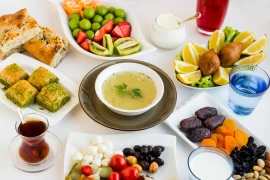
Basic Principles of Weight Control for Those Who Want to Gain or Lose Weight
- Basic Principles of Weight Control for Those Who Want to Gain or Lose Weight
- The Scientific Background of Losing or Gaining Weight
- Weight Loss / Gain Process
The Scientific Background of Losing or Gaining Weight
Most people think that eating less is enough to lose weight. However, this reasoning, which seems plausible at first glance, has no scientific basis. The factor that determines weight gain or loss is the amount of calories we take into our body through what we eat and drink.
Every person has an amount of calories that they need to maintain their vital activities. Variables such as the person's age, life, job, gender, muscle ratio determine the daily calorie needs of the person. The amount of calories needed by a 40-year-old office worker and a 30-year-old physical education teacher is different from each other.
So how is the calorie requirement calculated? You can find out your daily calorie needs by consulting a dietitian or using the calorie requirement calculator mechanisms available on some sites on the internet.
Weight Loss / Gain Process
After you know your daily calorie needs, you must decide how many kilos you want to be. In order to gain / lose a kilo, it is necessary to create an average of 7000 calories difference.
For example: If a person with a daily calorie requirement of 2600 takes 2950 calories by taking an extra 350 calories a day, he will gain one kilogram in twenty days. Likewise, if a person with a daily calorie requirement of 2600 takes 350 calories less for twenty days, he will have lost one kilo at the end of twenty days. Do not forget to take into account that if you start or stop exercising or change your lifestyle during this period, your daily calorie needs will change.
When all this is taken into account, it is clearly seen that it is not more or less food that enables us to lose or gain weight, but rather the quality of the food, namely macronutrient values.
For example, a green salad is a mixture of greens. Since herbs are very low in calories, a person will not gain weight no matter how much salad he eats. The critical point in the salad is the oil we put in it. Fats are the foods with the highest calories per unit. There are 17 calories in 100 grams of salad and 884 calories in 100 grams of fat. In this calculation, if a person who consumes 100 grams of fat only consumes 5 kilograms and 200 grams of salad, he will have taken the calories he received from 100 grams of fat, so it is necessary to pay attention to the calories of the foods consumed, not to eat more or less.
This is the most basic logic of losing or gaining weight.





